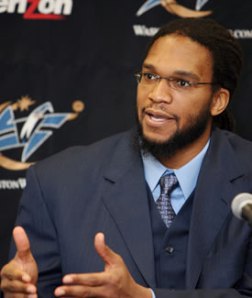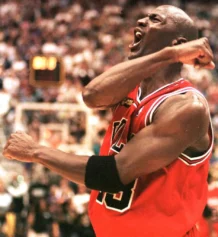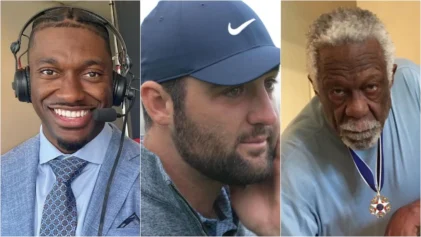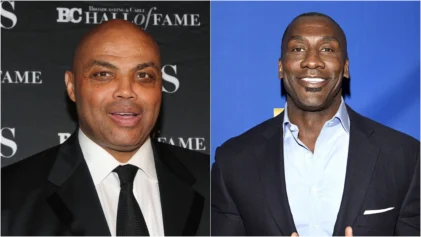
His offense? Driving two miles over the speed limit. Two.
“We were looking at each other like, ‘Is this guy serious?’” he said.
The white officer was quite serious.
Thomas recalled him saying, “Yeah, two miles. You were speeding. In fact, get out of the car and let me look into it. Do you have any weed on you? Anything in the ashtray?’
“We’re like, ‘No. All of this over two miles over the speed limit? Are we being ‘punked’? Is Ashton Kutcher going to come running out?’ It was that crazy. I don’t even like driving through Virginia, I have been stopped so much.”
Scenarios like that inspired Thomas two weeks ago to craft an open letter to NBA Hall of Famer Charles Barkley, who had said he agreed with the Ferguson, Mo. grand jury to not indict officer Darren Wilson for shooting and killing unarmed teen Michael Brown on August 9.
Thomas has been harassed by police, profiled, followed. . . the entire gamut of racial stereotyping that comes with being Black. So when Barkley gave his opinion, Thomas said he was moved to create a response because “the overall atmosphere that is created by cops when they stop you is something most of America just doesn’t understand.”
In an interview with Atlanta Blackstar, Thomas said his life has not changed much since his eloquent letter to Barkley went viral on social media. He has thousands more friend requests on Facebook and thousands more followers on Twitter. But his day-to-day life persists: Addressing the racial divide in America and how Blacks have been violated in all walks of life.
Without consciously doing so, Thomas, 36, took on another media personality in Fox’s Bill O’Reilly.
When asked about professional athletes speaking out against police violence, Thomas said he was pleased to see the involvement, but “more surprised by the criticism of the athletes’ protests. I’m watching Bill O’Reilly, and he’s criticizing the St. Louis Rams players because they have a different opinion from his. He basically was saying, ‘Don’t pay attention to them. They’re just dumb athletes.’
“He and others criticized Kobe Bryant for his comments. And they pointed out how much money he makes and where he grew up, and I’m saying, ‘You are missing the whole point. It doesn’t matter how much money you make or where you grew up.’ When we are out in the street, driving, the police sees you as a Black man, they don’t know you’re an NBA player or NFL player or a lawyer or banker or doctor or whatever your profession is.
“They see a Black man in a nice car in a nice neighborhood and they profile you and stop you. And that’s the disconnect that mainstream America can’t understand: Once an athlete steps off the field or the court, they are just a Black man like any other Black man who gets stopped by the police.
“Bill O’Reilly doesn’t understand that connection. He was saying, ‘Well, when I get stopped by the police, I just obey their commands and everything is all right.’ I’m like, ‘Wow. You really have no idea. Your interaction with the police is completely different than our interaction.’ Usually, people who look like Bill O’Reilly have to give them a reason to pull out their billy club or their gun. Black men like me have to give them a reason not to pull out their billy club or gun. And that’s what mainstream America doesn’t understand. Apparently Bill O’Reilly doesn’t understand. It doesn’t matter if you’re an athlete or a teacher or what your occupation is or college credential is, because they only see one thing: our skin color.
“Bill O’Reilly doesn’t experience what we experience.”
Thomas said he was “amazed” by the barrage of #CrimingWhileWhite messages that stormed social media last week. “We don’t have stories like that,” he said. “Stories like, ‘Yeah, I was drunk in college and I took a swing at the cop and said, ‘You dirty pig.’ And the police took me back to my dorm room and told me to be safe and stay out of trouble. I’m like, that’s not the way that would have played out with a brother.
“Our stories are like, we were walking, minding our business in a dark stairwell in Brooklyn and a rookie cop sees us and shoots us. And instead of calling the paramedics, they let us bleed out while they call their union reps. Those are our stories.”
Thomas is not a fly-by-night revolutionary. He grew up in Oklahoma with a mother as a school teacher. She introduced him to the stories of athletes who were also civil rights activists, like Muhammad Ali, Bill Russell, John Carlos and Tommie Smith.
“It was always just a part of who I was,” he said.
The author of three books, including last year’s “Fatherhood: Rising to the Ultimate Challenge,” Thomas retired from the NBA after nine seasons in 2011 and has spent his time since doing inspirational speaking, organizing panel discussions on fatherhood. . . anything that works toward building better race relations and aiding young Black boys.
“I have such a passion for people, especially our young men because they are inspired by us,” he said. “They can be so positively influenced by people they recognize. I can’t speak for (other pro athletes). I just know I remember (ex-NBA stars) Wayman Tisdale came to my high school and John Starks to our middle school and Lee Mayberry. We listened to every single word they said. One of my teachers said, “Why don’t you listen to us like that?” I said, “Because you’re not Wayman Tisdale.’ Simple as that.
“As I got older, I saw the power in that. My mom had me come back when I was in college (Syracuse) to speak to students. I saw the reaction from it, how they are affected by it. I could see it in their eyes that they were inspired. When you hear, ‘Hey man, you helped change my life,’ that’s phenomenal. When you experience that, it makes you want to do more, to help more. When you’re a pro athlete, your voice is louder. And you use that power for good.”
Thomas said his message to youths has not changed over the years, but it gets more attention now, in the aftermath of the rash of police shootings of unarmed Black males.
“My message is,” he said, “that it’s not just cops gunning for you. It’s society as a whole. You have to know there are certain traps that you have to maneuver around. That’s how it is. CrimingWhileWhite—you can’t do what they do. You’re not going to get caught in a meth lab and be told to go to rehab and it’s all good. That’s not happening for us. There are going to be people who want nothing but for you to fail. They can come in the form of a police officer or a coach or a teacher or a so-called friend. So you have to know what you’re about.”
Thomas attended the Justice For All march against police officers slayings in D.C. on Saturday and left somewhat hopeful about the future.
“This has awakened people to understand how far we have to go. The words ‘post-racial’ shouldn’t come out of anybody’s mouth,” he said. “A lot of times America likes to try to fool the people that everything is OK, when it’s not. There were a good amount of white people at the march, and they were shocked by how bad it is—and they were outraged by it. . . People are uprising and telling you that they are not happy. People have to pay attention to the protests. I just hope it keeps up and we all use our voices, use our power for good.”


